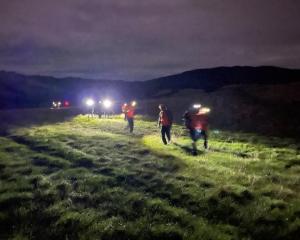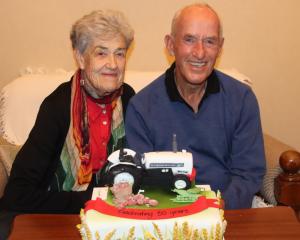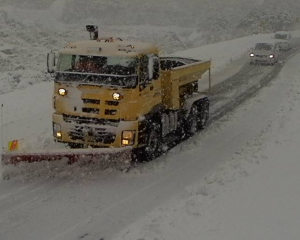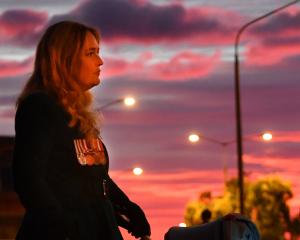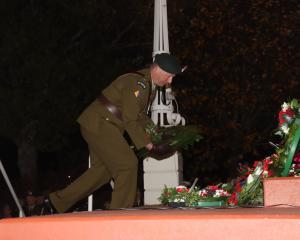Former Northland rural report broadcaster Goldie Wardell is amused, but slightly miffed, that a term he introduced to New Zealand's farming lexicon is now being called derogatory, and is banned in some circles.
It's Gypsy Day. There, we've said it (while we still can).
"I've come in to confess," Mr Wardell announced not too penitently. "I started the expression."
Mr Wardell's voice sounds familiar as he relates the story of how, back in the 1980s, he coined the phrase Gypsy Day for June 1, the traditional day sharemilkers pack up their cows and households and move to a new farm.
He worked on the wireless for 18 years, telling early morning and lunchtime listeners on National Radio the price of meat and veges, milk and wool, farms and flowers in Northland. That voice still sounds as if it's being ratcheted out of the same box an auctioneer or horse racing caller might use.
But, back to the day the informal name of which Otago District Council has decided should not be used because of its association with the ethnic group also called the Roma.
"I was going along a metal road here in Northland," Mr Wardell recounts. "I saw the dad walking up front, heading toward a farm gate on the side of the road.
"As soon as I saw the farmer I slowed right down because I knew there'd be a herd of cows coming along the road and sure enough, there they were, ambling along. There were a couple of children quietly walking alongside the cows, just pushing them along the road with no fuss.
"Next, behind them all came mum, driving the car towing a trailer behind it, full of the family's belongings. The car was overflowing, the trailer was packed high with furniture and boxes and buckets, everything you could imagine teetering on top and hanging over the sides.
"I thought of Gypsies, packing up their home and moving to another farm.
"It was a sight I'll never forget, but also one you used to see many times."
The next day on the wireless, Mr Wardell described the scene and said Moving Day or Sharemilkers' Day could just as well be called Gypsy Day. It stuck, and it spread.
It was an idyll, a simple scene of rustic, pastoral life, Mr Wardell had described and one that many people entertained without considering for a moment there might be anything racist or insulting about it.
But recently the Otago council ruled not to use the words Gypsy Day in its own documents or conversations, a decision that led to a segment on TV1 evening show Seven Sharp. In that segment reporter Rebecca Edwards carried out a vox pop.
Most people seemed not to consider it intentionally derogatory and a few made their own derogatory comments about the PC-ness of the matter in the first place."Ridiculous," Mr Wardell offers.
Sharemilking was just one of the rural angles Mr Wardell covered during his time on radio.
He watched the development of the kiwifruit industry, new ideas move onto the land such as goat farming for milk, meat and fibre -
"I believed then and I still believe there's a future in farming goat meat" - and an ostrich fad that proved to be all feathers but little fat.
As for the price of everything, Mr Wardell knew his onions. Where growers, buyers, shopkeepers and shoppers needed to hear how much a lettuce or sack of spuds might cost, farmers listened closely to the morning reports to hear the stock sales prices.
"Lawyers and accountants used to listen to the reports, too. When the bosses down in Wellington pulled it off the air, I had many lawyers and accountants telling me how they'd relied on those reports."
Queen St farmers, the reporter thinks, remembering another term coined in the 80s.
No, Mr Wardell says. "It was so when their farmer clients came in, they knew how much their stock were really worth."
He started farming himself in the early 60s when his father bought him a small dairy farm at Aranga, north of Dargaville. He married a local girl Peggy (nee Jones) and they were married 54 years before she died a year ago.
Many years ago, when the Northland rural reporter left, the boss asked Mr Wardell to step in temporarily.
"They told me it wouldn't last because I didn't have the right voice for it. Seventeen years later I was still there."
It was a lot of fun, and he covered a lot of ground in his day, based out of the radio studio in Rust Ave.
He was heard all over the country and took a slightly evil pleasure in making his Northland report across the Southland station, for example.
"I'd tell them I was sitting outside in the sun having my coffee while I was making my report, knowing full well it was still dark and freezing in Invercargill," he chuckles.
We've covered a lot of ground during our chat, too. It's time for Goldie Wardell, local rural reporter and lawn bowler extraordinaire, to head off somewhere else.
But first we're back to the topic of Gypsy Day, and how he really didn't like seeing the story on telly.
"If I'd known their phone number, I'd have rung them then and there and said 'what nonsense'."

